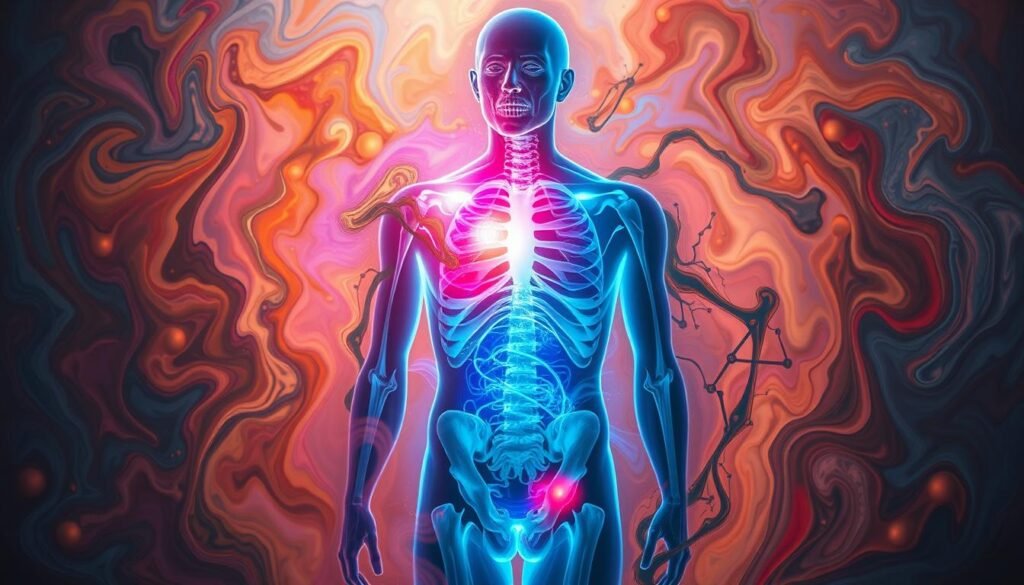Nearly 80% of adults will face body aches and fatigue at some point. These symptoms are common but can point to more serious issues. It’s key to know when to get medical help for ongoing discomfort.
If your pain doesn’t go away with rest, or if you have dizziness or trouble breathing, see a doctor. Chronic pain and fatigue have many causes, like infections or lifestyle choices. Identifying the cause is the first step in getting better.
Don’t just rely on over-the-counter solutions without understanding your symptoms. Talking to a health expert can guide you toward the right care. Interested in more? Check out medical insights on body aches.
Key Takeaways
- Persistent body aches and fatigue can indicate a range of health issues.
- Immediate medical attention may be necessary for severe symptoms such as muscle pain with difficulty breathing.
- Self-care methods include rest, over-the-counter pain relievers, and ice application.
- A doctor’s visit is recommended if symptoms persist beyond two weeks.
- Understanding the underlying causes can lead to appropriate treatment options.
Understanding Body Aches and Fatigue
Body aches and fatigue often tell us about health problems. They show up as symptoms of stress, hard work, or sickness. People with body aches might feel sharp pains, dull aches, or general discomfort in their muscles. It’s important to notice these body aches symptoms to manage them right.
Around 1.71 billion people worldwide deal with musculoskeletal issues. Knowing about body aches helps us figure out when they’re serious. Short-term aches can come from small injuries or too much activity. Long-term aches might need a doctor’s care.
The reasons for fatigue vary, from not enough exercise to complicated health problems like autoimmune diseases. It’s key to know if fatigue is short-lived or ongoing. For example, chronic fatigue syndrome causes extreme tiredness that rest doesn’t fix. We must understand if fatigue comes from weak muscles or mental stress to treat it correctly.
Common Causes of Body Aches
Body aches often come from many sources. These can range from minor illnesses to serious, long-term conditions. Knowing these causes helps us decide when to get medical help.
Infections and Viruses
Infections like the flu and cold are known for causing body aches. Our bodies fight these infections and viruses, causing inflammation. This leads to sore muscles. Along with aches, you might also have a fever, feel weak, or have symptoms of a cold. Every year, the flu affects millions, showing how common it is. It’s good to remember that these aches often get better with home care in three to five days. If they don’t go away, seeing a doctor is a good idea to check for serious issues.
Chronic Conditions
Long-lasting conditions are a big reason for continuous body aches. Conditions like fibromyalgia cause widespread pain, tiredness, and poor sleep. Arthritis is another, causing long-term joint pain that affects how we move and feel. People with psoriatic arthritis have joint pain and stiffness that lowers their quality of life. Knowing how chronic conditions affect muscle pain is vital. For more details on muscle pain reasons, you can check trusted sources.
Lifestyle Factors
How we live also affects our health and can lead to body aches. Eating poorly and not drinking enough water can make our muscles tired and sore. Stress can make our muscles tense, adding to our discomfort. Also, not exercising enough can weaken our muscles, making them hurt more. Around one in sixteen people deal with severe tiredness and muscle pain. This shows the importance of changing our lifestyle for better health. Here’s a quick overview of common body ache causes:
| Cause | Description | Common Symptoms |
|---|---|---|
| Infections and Viruses | Response to the flu, common cold, or other viral infections | Fever, fatigue, muscle soreness |
| Chronic Conditions | Conditions like fibromyalgia and arthritis leading to persistent pain | Widespread pain, joint stiffness, fatigue |
| Lifestyle Factors | Poor nutrition, high stress levels, lack of exercise | Muscle tension, fatigue, discomfort |
Signs and Symptoms That Warrant Medical Attention
Sometimes, pain that keeps on happening might mean there’s a deeper health issue. If pain sticks around for more than a few days, gets worse, or messes with your day-to-day, it’s time to pay attention. Pain like this could be chronic and may need a doctor to check it out.
Persistent Pain
If you’re dealing with pain that won’t go away, it’s a good idea to get medical advice. Especially if the pain:
- Lasts more than a few days.
- Becomes sharper or more intense.
- Makes daily tasks hard to do.
Pain that doesn’t quit can really lower your quality of life. It might also be a sign of bigger health problems.
Accompanying Symptoms
When persistent pain comes with other strange symptoms, you should see a doctor. Some signs to watch out for include:
- Fever – A high temp could mean an infection or swelling.
- Rash – Changes in your skin could suggest allergies or autoimmune issues.
- Weight loss – Losing weight without trying can be alarming.
- Changes in bodily functions – Any weird changes need checking out.
If pain keeps up along with these signs, getting medical help fast is key. This can help find the real cause and get the right treatment. This way, symptoms get better and health improves.
When to See a Doctor for Persistent Body Aches and Fatigue
It’s important to take charge of your health. This is especially true for unexplained fatigue and ongoing body aches. Muscle discomfort can come from stress, using muscles too much, or minor injuries. Yet, it’s crucial to know when to seek medical advice. If body aches don’t get better with rest, ice, or pain relievers, you might need to see a doctor.
Feeling constantly tired and letting it disrupt your life is a warning sign. Conditions like fibromyalgia and autoimmune diseases can cause these vague signs. This makes it hard to figure out what’s wrong. A doctor can help by checking your symptoms and maybe doing tests.
Severe pain, fever, or sudden weakness can mean something more serious. If muscle pain doesn’t go away after three days or gets worse, call a doctor. Feeling extremely tired along with other troubling signs should also make you seek help fast. Quick help from a doctor can lead to better results and treatments made just for you.

Don’t wait too long to get help. Ignoring ongoing body aches and fatigue can make things worse. Seeing a doctor not only helps in treating the issue but also helps you understand your health better.
Impact of Stress and Lack of Sleep on Body Aches
The link between stress, sleep, and physical health is complex. It shapes our well-being. Knowing how stress impacts us can explain why we feel aches and tired. Stress can make muscles tense, cause inflammation, and lower immune function, increasing discomfort.
Effects of Stress on the Body
Stress appears in our bodies in many ways. Muscle tension, leading to aches in the neck, back, and shoulders, is common. Long-term stress makes these pains worse, trapping us in a cycle of aches. It can also cause headaches and stomach issues, affecting our health even more.
- Increased muscle tension resulting in pain
- Headaches and migraines
- Gastrointestinal disturbances
- Weakened immune response
To combat stress, try regular exercise, relaxation, and mindfulness. Hobbies and friends can also boost mental health.
Sleep Deprivation and Its Consequences
Not getting enough sleep impacts our mental and physical health. It makes us more sensitive to pain, worsening body aches and tiredness. Research tells us that poor sleep is a big risk for chronic pain.
Broken sleep harms our body’s ability to fight pain, making existing aches harder to handle. Those with insomnia or bad sleep patterns face even tougher challenges.
| Impact of Sleep Deprivation | Consequences |
|---|---|
| Chronic pain development | Increased incidence of muscle and joint pain |
| Heightened sensitivity to pain | Inability to cope effectively with discomfort |
| Impaired healing process | Longer recovery periods from injury or illness |
| Increased fatigue | Reduced motivation and energy levels |
Sleep loss often leads to a vicious cycle of stress and tiredness. It’s crucial to manage sleep and stress to improve health.
Identifying Underlying Medical Conditions
It’s crucial to recognize underlying medical conditions with ongoing body aches and fatigue. Conditions like lupus and multiple sclerosis are common. They happen when the immune system attacks the body by mistake. This leads to symptoms that impact everyday life. Spotting these conditions early is key to handling them well.
Autoimmune Disorders
Autoimmune disorders show up in different ways, including lasting body aches. Lupus might bring on joint pain, and multiple sclerosis can cause muscle weakness and fatigue. Getting diagnosed on time and starting the right treatment can make life better for those affected. Knowing the signs is the first step to managing them.
Fibromyalgia and Chronic Fatigue Syndrome
Fibromyalgia and chronic fatigue syndrome are often mixed up because they share symptoms. They both include severe fatigue, body aches, and trouble sleeping. A detailed check-up helps tell them apart to plan the best treatment. If you’re experiencing these symptoms, it’s important to get help from a doctor.

| Condition | Primary Symptoms | Common Treatments |
|---|---|---|
| Autoimmune Disorders | Chronic pain, fatigue, joint issues | Immunosuppressants, corticosteroids |
| Fibromyalgia | Widespread pain, fatigue, sleep disturbances | Antidepressants, pain relievers |
| Chronic Fatigue Syndrome | Extreme fatigue, muscle pain, cognitive issues | Cognitive behavioral therapy, lifestyle modifications |
Consulting a Physician: What to Expect
When you see a doctor for body aches and fatigue, expect a full check-up. This starts with your medical history. Your doctor will ask about past health, medications, and lifestyle.
Next, a detailed physical exam will take place. The doctor will look for signs linked to your aches. If needed, they might suggest extra tests, like blood work or scans, to learn more.
About 20% of visits to family doctors are because of fatigue. Often, conditions like depression cause long-term tiredness. Doctors’ views on their ability to evaluate these issues vary. Some think they do very well, while others believe they do just okay.
It’s crucial to talk openly with your doctor about all your symptoms. This helps them understand your situation better. Knowing everything, they can recommend the best treatment. This might include changing how you live, taking medicine, or seeing other doctors.
Getting advice from a doctor early can effectively treat your body aches. This step helps avoid worse problems and boosts your health.
Self-Care Measures for Managing Body Aches and Fatigue
Finding self-care for pain management helps ease body aches and fatigue. Simple home remedies can give quick relief and boost your health.
At-home Remedies
Rest, warm baths, and gentle stretching help a lot at home. Pain relievers from stores can also lessen pain. Drinking enough water and eating right are key.
Foods like tart cherry juice, coffee, and bananas can cut down tiredness. Knowing how these foods affect you promotes better health choices.
Importance of Lifestyle Modifications
Making good lifestyle changes can really help with tiredness. Working out makes your body stronger and work better. Getting enough sleep refreshes you, while stress management like yoga or meditation reduces tiredness.
Avoiding alcohol and less caffeine intake are good health steps. If tiredness doesn’t go away, getting professional advice is important. Consulting a doctor is crucial for ongoing fatigue and body aches. For more info on handling tiredness and its causes, visit this resource.

Pain Management Strategies
Chronic pain is a big issue. It costs a lot in the United States. Finding the right ways to manage this pain can improve life for those suffering. Conditions like arthritis, headaches, and back pains need special plans.
Teamwork is key to tackle chronic pain. Healthcare pros like neurologists and physical therapists work together. The treatment plan might include:
- Medical management with meds you can buy or need a prescription for
- Physical therapy with exercises to help you move better
- Support for emotional health to deal with sadness related to pain
- Educating patients and families to support healing
- Alternative treatments like acupuncture for pain relief
Starting with physical therapy could be a good move. Physiotherapists show you exercises to reduce pain and get active. Doing work tasks can also distract from the pain. This might help avoid the sadness that comes with not being active. Talk to your doctor about how to get back to work safely.
If common painkillers don’t help after two weeks, see a doctor. They can offer other pain management solutions. Being proactive and knowing your options is important for dealing with chronic pain.
Looking into adrenal health can also help your pain management. Check out natural remedies for adrenal fatigue. This information might improve your overall well-being.
Conclusion
It’s crucial to understand body aches and fatigue to keep healthy. If you know the signs, you can get help early. This approach helps handle chronic pain and fatigue better.
Fatigue makes you feel tired and worn out. It can come from mental or physical issues. Changing your lifestyle, like sleeping better, eating well, and controlling stress, helps manage it. Knowing how to do these can improve how you feel each day.
Knowing about health is key to dealing with aches and tiredness. With good information and actions, you can better manage your health. This ensures a better life by making smart choices and caring for yourself.